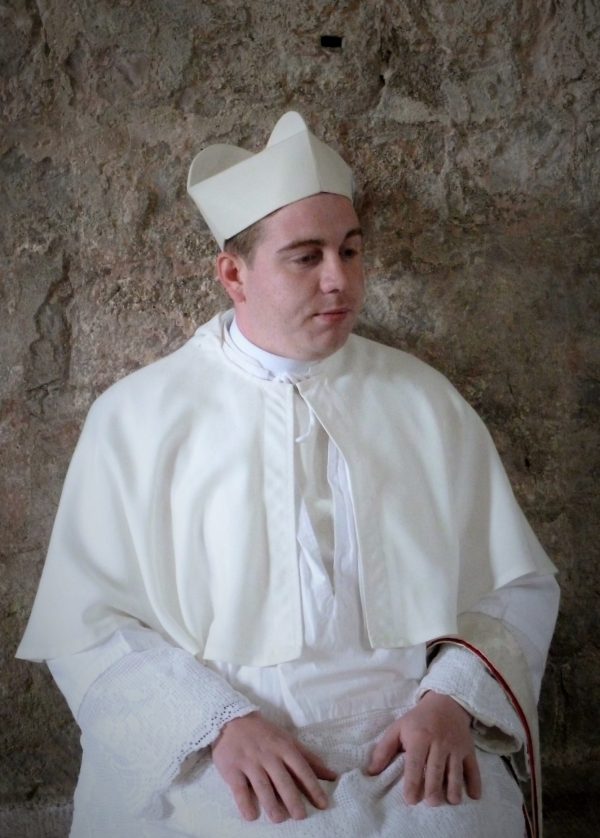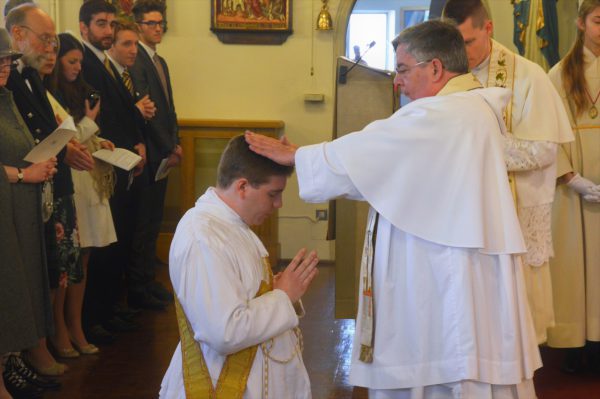Vocations
We welcome enquiries regarding vocations, to the Novice Master and Vocations Director.
If you would like to email the Novice Master, Abbot Hugh Allan, please do so at community@norbertines.org.uk
Men who apply to join our canonry of the Order of Canons Regular of Prémontré are usually between 20 and 40 years old, and more often than not come to us having already obtained a university degree, however there are some exceptions. They should be in good mental and physical health, free of financial obligations or debt, and free from other impediments to religious life or holy orders as described in Canon Law (for example, they must be single.)
Unless a man specifically wants to be a lay brother or a donatus in private vows, admission to the noviciate is done so with a clerical vocation in mind. Canons regular are ordinarily admitted to Holy Orders after Solemn Profession. This is because the Augustinian model of life which we follow includes both the contemplative and the active sides; we are an Order of priests living under a Prelate and governed by Chapter. The priestly ministry exercised by each member of the canonry can vary, and so our training is conducted with this in mind. Candidates need not feel they have to be “intellectual” as such, however they would need to be capable of serious academic study at university level, and have the personal qualities and aptitudes needed for an engaging, pastoral priestly service.
Steps on the way
First Step
Be in touch!
Second Step
Initial conversations/correspondence with the Novice Master
Third Step
When appropriate, an invitation to visit the canonry.
Fourth Step
If, after a visit or visits to the canonry, the possibilities of a vocation with us are clear, then the candidate may be invited by the Novice Master to apply to join the noviciate.
Noviciate
After a suitable period of postulancy (living with the community), the novice is clothed in the white habit, given a religious name, and follows the program of the noviciate (which lasts at least one canonical year). During the noviciate the novice undertakes an in-house formation in the Constitutions of the Order, the Holy Rule, the History of the Order and of the Canons Regular, the Chant and Liturgy of the Order, an introduction to Latin, and laying the foundations for seminary studies in the sacred sciences.
Juniorate
If a novice is invited to apply for temporary vows, he makes his first profession at the end of the noviciate, and these vows last for three years. During this time, he may begin clerical studies, at a seminary or other institution, beginning with two years of philosophy, and three years of theology. The Ratio Institutionis of the Order provides a framework for this and all formation within the Order.
Solemn Profession
If a junior is invited to apply for solemn (perpetual) vows, he makes this profession at the end of the juniorate, and is admitted formally into the canonry (incorporation). He is now a full member of the canonry, with a voice at the canonry chapter, and by virtue of his solemn profession, is a candidate for Holy Orders, as soon as his studies are completed.
Ordination
After Solemn Vows, the brother completes his studies for priestly ordination, and is given dimissorial letters admitting him to the Sacred Orders of Diaconate and Priesthood. After a period as a deacon (typically short within our Order, as Our Holy Father Norbert was admitted to both orders on the same day), he is ordained a priest of Jesus Christ, and begins to function fully in the apostolates of the canonry, under the direction of the Prelate.
Throughout this process, much prayer and discernment is involved. It is not merely the candidate who chooses a way of life, it is the community as a whole which chooses him as a brother. Since we are called to be “of one mind and one heart on the way to God,” there are various stages at which the suitability of the candidate is tested and proved, always with due regard for prayer, and the workings in his soul of supernatural grace. If God wants you to be a priest, He will make you one. If He doesn’t, you can be sure that He will make this apparent, and show you what it is He does want you to do.
What about women in the Order?
Since the foundation of our Order, St. Norbert called women to the canonical way of life he founded. We have canonries of enclosed nuns (canonesses) who live a cloistered life of contemplation, intense prayer, and manual labour; and we also have communities of sisters, in various congregations linked to our Order, who live a contemplative and active life, often in teaching, nursing, hospitality, and a range of charitable activities. At present, there are no communities of women in the United Kingdom. We look forward to the day when Canonesses and Sisters of our Order will return to these shores to spread the charism of Our Holy Fathers Augustine and Norbert and live at the service of the people of God in these islands.

